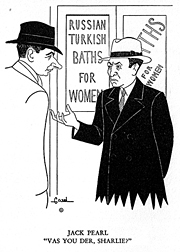Here’s Chapter 8 of In Your Hat, the 1933 tell-all memoir by Hat Check Girl to the Stars, Renee Carroll, in which she shares tales of by the many celebrities she encountered while working at Sardi’s, among them George Burns and Gracie Allen, Eddie Cantor, George Jessel, Norma Talmadge, George Raft, Wallace Reid, Ginger Rogers, Douglas Fairbanks, and many more.

A STOOGE, in Broadway parlance, is the assist in the act. If you do an accordion routine and a heckler is paid by you to annoy your act from the box, then you’re probably Phil Baker and your stooge eventually becomes as famous as you are. Witness Sid Silvers of Take a Chance fame.
Broadway is full of stooges, both in real life and on the stage. It may sound strange to you but the jester in the king’s court from the time of The Erl King (I don’t know why they insist on spelling Oil as Erl) has been brought down the years until now he is labeled “stooge.” His job is to take he hard knocks, furnish the opportunity for the gag to be sprung, and appear the perfect fool.
When Phil Baker, who pumps a mean accordion, opened in a show in New York and had a stooge in the box doing the regular routine, Al Boasberg, the gagman who writes funny lines for a dozen or more comedians, wired Baker:
| LIKED YOUR ACT STOP THE OLD GENT WITH THE ACCORDION WAS GOOD TOO. |
Gracie Allen, of the famous team of Burns and Allen, is the stooge of the act, even though it is she who pulls all the funny lines. Recently she gave George Burns cause to laugh when she came to him with an idea.
“Georgie, dear,” Gracie said. “I have an idea.”
“Well, let’s forget it,” George answered characteristically, knowing it would bring on the usual headache.
“I’ve thought of a line for our act,” she continued.
“All right,” gave in George. “What is it?”
“I can’t tell you until I’ve gotten a prop.”
“What sort of a prop?”
“A muff.”
“What’s a muff?” George wanted to know.
“It’s one of those things women used to carry around so that they could hold hands with themselves.”
“All right, Gracie, get yourself a muff and let’s have the gag.”
She went to the best furrier on the Avenue and ordered a muff made. It has to be matched sables, four skins, exquisitely sewn. The muff cost $250 and she charged it to Geroge Burns, her husband. She brought it to him one day.
 “Here’s the muff, George.”
“Here’s the muff, George.”He examined it carefully. He approved.
“I got it at a bargain, George.”
George immediately became suspicious.
“How much, Gracie? How much?” he pleaded.
“Well—er—two hundred and—er—fifty dollars.”
George felt around for support.
“Two hundred and fifty smackers for that thing? Gracie, you’ll ruin me!”
“But it’s a bargain, George, and the furrier let me have it at that price because there are two holes in it!”
And she held up the muff to show him the holes in which one is supposed to insert one’s hands. Burns was nonplused.
“But what about the gag?” he wanted to know. “Is the gag worth $250?”
“Why, George,” giggled the she-stooge, “I just did it. You see, I come on with this muff and you ask me how much I paid for it and I say: ‘I got it at a bargain because it had two holes in it.”
With which Mr. Burns fainted dead away. And that’s how jokes are born in case you’re interested.
Read More »
